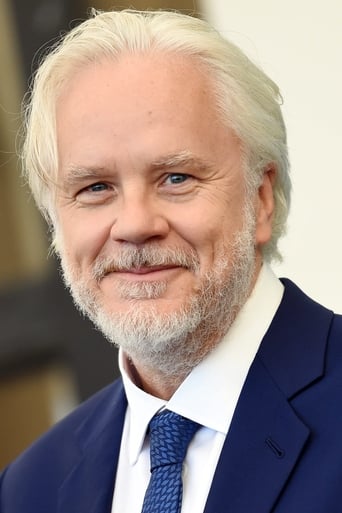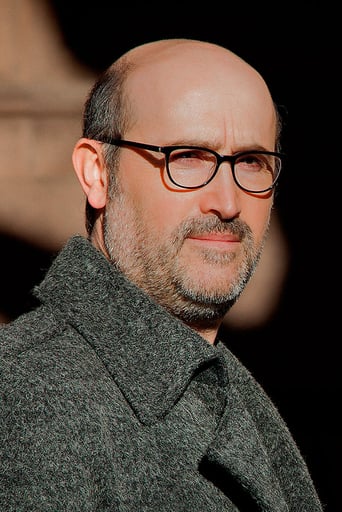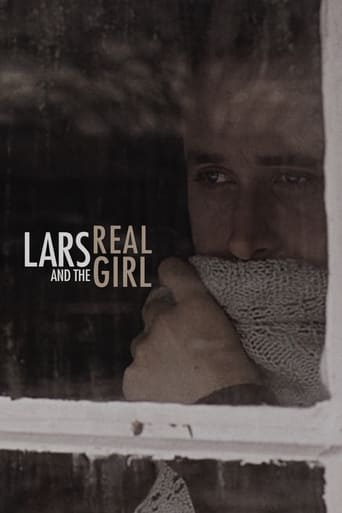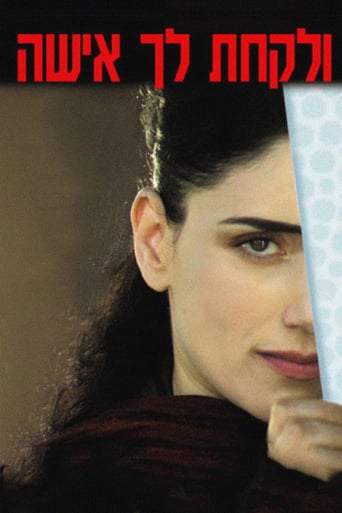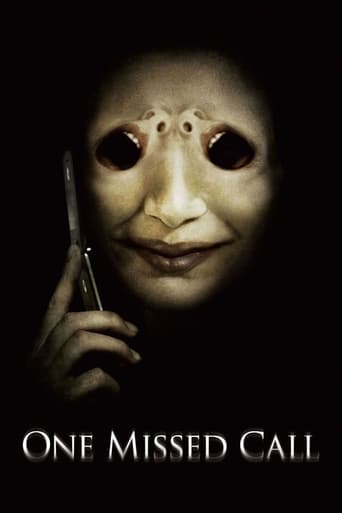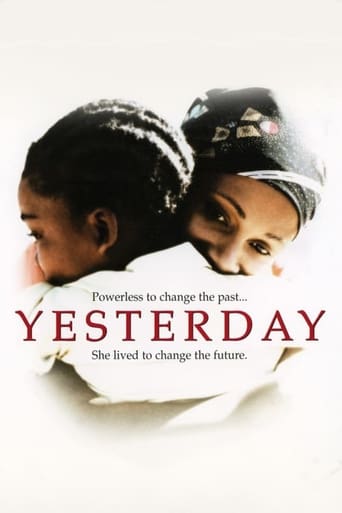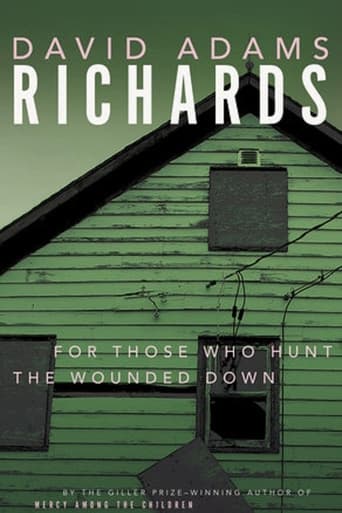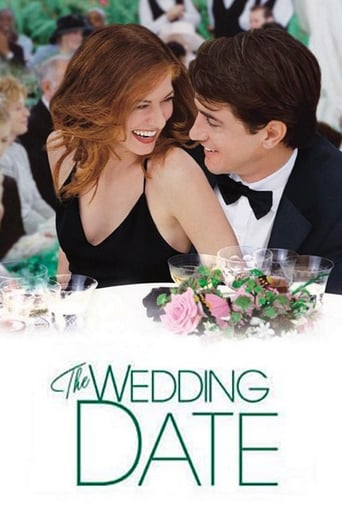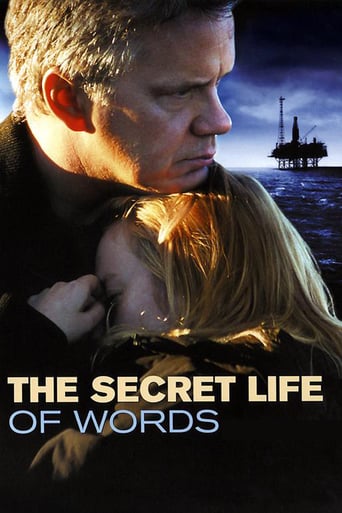
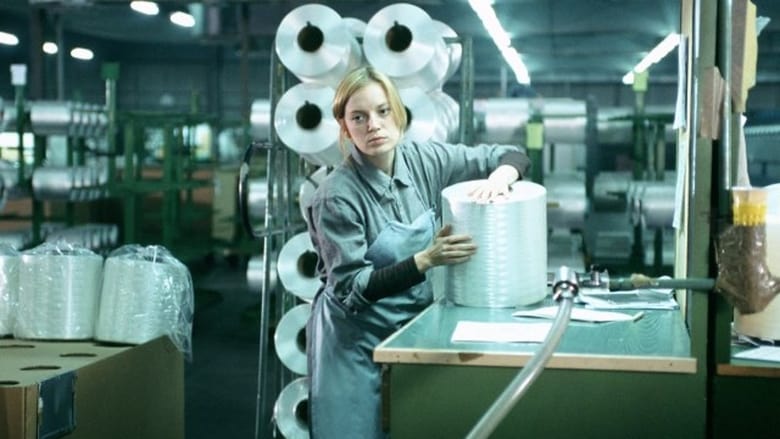
The Secret Life of Words (2005)
A touching story of a deaf girl who is sent to an oil rig to take care of a man who has been blinded in a terrible accident. The girl has a special ability to communicate with the men on board and especially with her patient as they share intimate moments together that will change their lives forever.
Watch Trailer
Cast
Similar titles
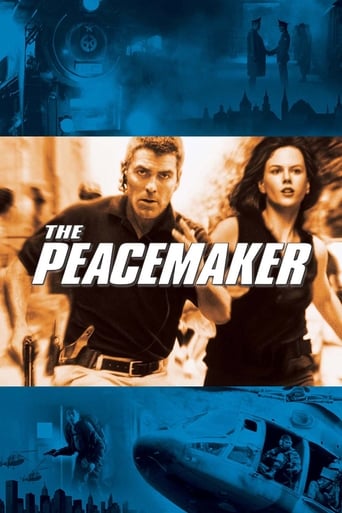
Reviews
Undescribable Perfection
Better Late Then Never
The film makes a home in your brain and the only cure is to see it again.
Blistering performances.
Hanna (Sarah Polley) is a refugee working at a factory. She wears a hearing aid and is haunted by her past. After four years of non-stop work, her boss forces her to take a month off for vacation. She calls Inge (Julie Christie) but she refuses to talk to her. She overhears Victor talking about needing a nurse. She takes the job on the North Sea oil rig caring for worker Josef (Tim Robbins) who was blinded by the fire that shut down the rig.It seems unrealistic that Josef doesn't get airlifted to a hospital right away. There are some excuses but that's what that is. There is a shocking reveal about Hanna's experience. It is definitely a shocking tale and the two great actors land that big scene. There is nobody better than these two actors but this story feels too constructed and manipulative.
such a heart-warming,soothing, sweet and humane story held by 2 wonderful dedicated, honest and gracious actors. in fact I've never liked Tim robins and i haven't seen many of his films but his performance completely swept me off my feet and made me dream of him as the perfect man, a man who feels and understands the pain of others and quietly delves in and take it away, the actress playing Hannah is always great in dramatic roles but her she was beautiful in every scene and when she smiled in spite of her suffering she melted my heart and the ending was more than satisfying. i forgot to mention the minor characters who were absolutely amazing and fitting especially the cook
In the opening scenes we are introduced to Hanna, a young woman working at a mindless assembly line job at a company called PoliSilk. Hanna is closed off, or has closed herself off, from most social contact. Her apartment is stark, consistent with our initial impressions. From her accent we know she is a foreigner living in an English speaking country. We think that she may merely be depressed, but we sense something deeper. Whether you will like this film will depend to a great extent whether people like Hanna arouse your curiosity or whether you disregard them. But the quiet ones are often the most interesting, still water runs deep as is said. It's a challenge to get to know such people and their stories. This challenge of getting to know Hanna is the central driving force of the movie. Hanna is so regimented that, in spite of her excellent work ethic, she has made her coworkers uncomfortable to the extent that they have made complaints to her manager who suggests that she take a month of vacation. She does that, but does not go far. It was never clear to me where she was coming from or where she wound up on vacation, but England and Ireland was my best guess. Hanna brings her solitude with her on vacation - a vacation for her seems like a punishment rather than a joy. While eating out she overhears a conversation in a restaurant that a nurse is needed to tend to a man who has been burned in an off-shore oil rig accident. She volunteers her services and is flown by helicopter to the rig. At first we don't know if she is faking it, but it becomes clear that she is an accomplished nurse. Why she is not employed as such is not mentioned - English labor laws?The conversations between Hanna and her patient, Josef, constitute the substance of the film. In the presence of each other the stories of Hanna and Josef exfoliate in an intensely absorbing way. If you are not engaged by people talking about themselves and telling stories then, if you have made it to this part of the movie, you will probably bail out. These scenes between Josef and Hanna are what make the title so appropriate. It is interesting how much we come to know one another simply by the words we speak to each other. Rather unnerving when you think about it.A movie based primarily on words has to have a good screenplay, and this is the case here. But a good screenplay does not guarantee a good movie, so it is fortunate that all aspects of this effort are high quality. As Hanna, Sara Polley is fantastically good. She is more than up to task of portraying the subtle transformations in Hanna's personality and delivers a heartrending climatic scene. And, as Josef, Tim Robbins has material that draws out his best.Most of us have not spent time on an off-shore oil rig, so getting some insight into what life is like in such an environment is interesting. The rig provides great backdrops for many scenes. If this were a stage play, the set designer would be receiving high praise.(spoilers ahead) Julie Christie's didactic speech toward the end flags this as a movie with a message. The point she makes about genocides being soon forgotten by all but the victims is not as true as she makes it out to be. She quotes Hitler as having said that the Armenian Genocide was forgotten within thirty years, but that is not true. The topic is still discussed and debated. In fact there has been much written on this and there is an article on it in the current issue of "The New Yorker" magazine (09-Sep-2007). And the Holocaust is still much in our minds. A central point is that witness should be given to the horrors of war, in particular to the inevitable consequences of wars to perpetrate deep and ineradicable scars on the innocent. I wish there had been more specifics about Hanna's story. Since she mentions having studied nursing in Dubrovnik, I assume she is a Croat and has been a victim in the Bosnian War in the 1990s. But maybe the lack of detail is meant to generalize the message to apply to any war. This movie did cause me to do a little research on the Bosnian War, but unfortunately any non-trivial understanding of that war appears to require major study - maybe another reason specifics were left out. One is led to contemplate the idea that it is important to remember the atrocities of the past. I sometimes wonder what is accomplished by that other than to make most people feel bad. To what advantage is it to me or society that I have seen footage of Nazis bulldozing piles of naked human bodies into trenches in concentration camps? After the Holocaust there was the idea that genocide should never be allowed to happen again. Have the memories of the Holocaust aided in the worldwide response to the genocide in Darfur? Perhaps so, but the response has not been one of overwhelming world outrage and willingness to help end it. Does a movie like "The Secret Life of Words" make us more conscious of genocidal wars and contribute to their prevention? Is there any way to blunt the hatred that precipitates such wars, a hatred that originates in the darkest parts of the human soul? Perhaps my having been made to think about such questions is a testament to the success of this movie?
Why is this woman so depressed? TSLOW does a great job of holding your interest on this mystery. Countless films try to hook you with this question (many with more lavish or exciting circumstances) but few succeed. TSLOW pulls it off and makes excellent use of setting; i.e., the lonely oil rig is a great idea. Although I correctly guessed at the source of Hanna's sorrow - the accent gave it away - I was no less captivated by her account. Tim Robbins does his usual fine performance. I don't know if the writer/director intended it, but Hanna's ordeal had the interesting effect of trumping the burn victim's problems, sort of like the moral, "I cried because I had no shoes, until I saw a man who had no feet." The film could have been excellent had the Hollywood crowd pleaser ending been changed. I would have been saddened but more appreciative if; e.g., Robbins had walked away from the shrink's office, understanding when to leave tragedy alone.

